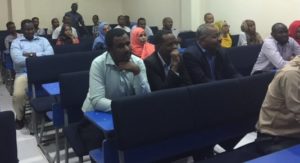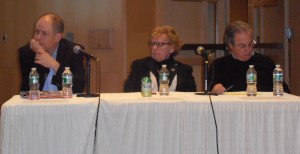Here’s a question I hope someone will ask both candidates in the coming presidential election debate: President Obama and Governor Romney, the American government is going to have to make critical decisions about the so-called “fiscal cliff” that we are heading toward just weeks after this election. Anxiety on that issue is already doing harm to the national economy, so answering this two-part question might itself be a significant service. One, can you tell us if there are any terms in your and your party’s established position where you would be willing to compromise if you are president-elect? Second, will you agree to meet or have your advisers
meet before the election and make a good-faith effort to find common principles and as much common understanding as possible on developing a solution that responsible members of both parties can support?
The perception of hopelessly gridlocked government damages all citizens and both parties. The candidates’ willingness and ability to overcome it is something we should be able to evaluate before the election, not after.
Speaking of the debate, if you’re not depressed enough about the campaign and the state of political discourse in this country; you might take a trip down memory lane back to the Kennedy-Nixon debates 52 years ago. I happened to be at an event a few days ago where some clips from
the first 1960 debate were shown, got curious and found the full transcript. (It’s on numerous sites on the Internet; looks as if the video is also easy to find, though I didn’t look that up.) The most striking thing about it was how striking it was — how unfamiliar and surprising it sounded. It had absolutely no resemblance to the contrived, empty guff that we’ve grown used to hearing in debates and political campaigns generally.
I’m not talking about subtle differences here. As I think you’ll agree if you read or watch it, the contrast smacks you in the face. This was essentially a grownup discussion of issues and policies. It was unmistakable that both candidates thought of the debate as an occasion to explain their understanding of the issues and their policies, and that’s what they’d prepared to do. They weren’t there to come up with the prefabricated six-second bite that was the only thing they hoped voters would remember. And there was no sense that they or the panel of questioners were not actually paying much attention to the answers but were waiting for one or the other candidate to make some damaging gaffe that everybody would spend the next 48 hours babbling about —
obliterating all the rest of the content and thus relieving everyone from having to think about complicated facts or difficult policy questions. Reading the transcript, you realize that the sound bite/gaffe era hadn’t been invented yet, and didn’t even exist in the candidates’ or questioners’ consciousness. There’s plenty about 1960 that one wouldn’t want to go back to, but on this issue, it was certainly a better time than this!
Arnold R. Isaacs
1788 Chesapeake Place,
Pasadena MD 21122
410-360-5836






